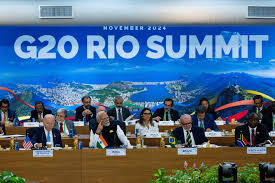Brazilian President Luiz Inacio Lula da Silva opened the G20 summit in Rio by introducing the Global Alliance Against Hunger and Poverty, an ambitious initiative aimed at combating world hunger. Lula described hunger as a scourge that shames humanity and called on world leaders to show courage to act.
The alliance, a milestone for Lula’s presidency, has been endorsed by 81 countries, with Argentina initially hesitant but later joining after negotiations. The initiative now boasts 147 signatories, including international organisations like the European Union, the African Union, financial institutions, and NGOs.

The alliance aims to address global hunger, which affected 733 million people in 2022—approximately 9% of the world’s population, according to UN data. Its focus includes improving early childhood nutrition, expanding free school meals, and supporting small-scale farmers.
Brazil’s Minister for Social Development, Wellington Dias, emphasised the need for political will, stating that eradicating hunger and poverty is not so hard, and the cost is not exorbitant.
The Inter-American Development Bank pledged $25 billion over five years to support hunger and poverty initiatives, while Nigeria plans to double its school meals programme to reach 20 million children, as Indonesia will introduce free canteens for 78 million students by 2029.
Meanwhile, the Vatican called for military funds to be redirected towards combating hunger.
The initiative is seen as a significant step in addressing global hunger, with organisations like Oxfam describing it as a potential turning point, though they urge additional reforms in agriculture and land rights.


